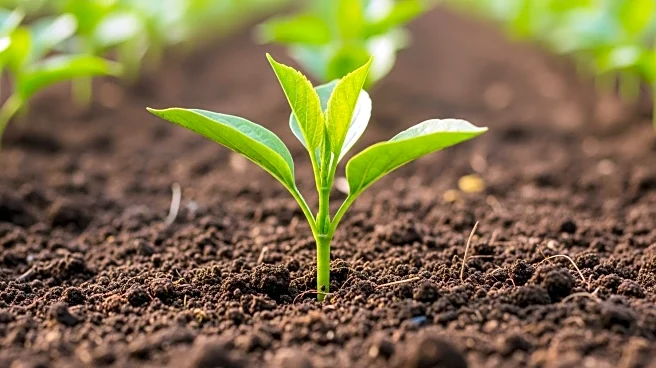What is the story about?
What's Happening?
The regenerative agriculture certification, verification, and digital solutions market is projected to grow significantly, with a forecasted 19.7% compound annual growth rate from 2025 to 2034. This growth is driven by increasing demand for sustainable agricultural practices that restore ecological health while maintaining productivity. The market includes various solutions such as certification programs, verification technologies, and digital platforms aimed at monitoring soil health, carbon sequestration, and biodiversity. The shift towards digital verification is propelled by consumer demand for sustainably produced food and the need for reliable data to manage risks and evaluate impacts in regenerative agriculture.
Why It's Important?
The expansion of regenerative agriculture practices is crucial for addressing environmental degradation and promoting sustainable food production. As consumers become more aware of the environmental and social impacts of food production, the demand for traceable supply chains and credible product labeling increases. This market growth supports farmers in adopting regenerative practices, which can lead to improved soil health, increased biodiversity, and reduced carbon footprints. Additionally, the integration of digital technologies enhances transparency and trust in the agricultural sector, potentially influencing policy and investment decisions.
What's Next?
The market is expected to continue evolving with advancements in sensor technology, data analytics, AI, and blockchain, providing powerful tools for digital verification. As the market matures, stakeholders including farmers, agribusinesses, and regulatory bodies will likely seek more comprehensive solutions to support the transition to regenerative practices. The focus will be on overcoming challenges such as financial constraints and technical expertise gaps, ensuring long-term sustainability and resilience in agriculture.
Beyond the Headlines
The adoption of regenerative agriculture practices has broader implications for global food security and climate change mitigation. By restoring degraded lands and enhancing ecosystem services, regenerative agriculture can contribute to sustainable development goals and reduce reliance on chemical inputs. The shift towards these practices also reflects a growing consumer preference for ethical and environmentally friendly products, potentially reshaping market dynamics and influencing global trade policies.















